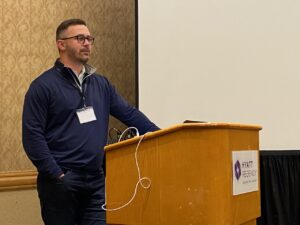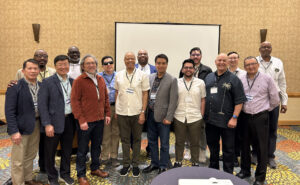
NASHVILLE, Tenn. (BP)–During the days leading up to President Bush’s nomination of Harriet Miers to the Supreme Court, “a couple” of the other candidates being considered withdrew their names from consideration, White House spokesman Scott McClellan said Oct. 12.
“Sometimes along the way people express that they would prefer not to be considered,” McClellan said. “And there were a couple of individuals in this instance that asked that they not be considered, and that was when the list was longer. The list was in the double digits at that point in time.”
McClellan — who refused to give names — was responding to comments made by Focus on the Family’s James Dobson, who said on his radio broadcast earlier in the day that White House aide Karl Rove had told him some nominees had withdrawn from the process, wishing to avoid a tough nomination fight.
“[W]hat Karl told me is that some of those individuals took themselves off that list and they would not allow their names to be considered, because the process has become so vicious and so vitriolic and so bitter that they didn’t want to subject themselves or the members of their families to it,” Dobson said.
Dobson’s conversation with Rove, which the Focus founder said took place Oct. 1, has been the subject of much conversation in recent days. Dobson endorsed Miers’ nomination on his radio program Oct. 5 but said there were “some things” he could not talk about because of “confidentiality.” When word got out that Dobson had spoken with Rove, some senators, including Sen. Patrick Leahy, D.-Vt., suggested that Dobson be subpoenaed in order to discover more about the Dobson-Rove conversation. Leahy is the ranking Democratic member of the Senate Judiciary Committee.
Dobson told his audience Oct. 12 that Rove had given him permission to reveal the content of their conversation, which took place two days before Bush nominated Miers.
“[E]ven today, many conservatives and many of ’em friends of mine, are being interviewed on talk shows and national television programs,” Dobson said. “And they’re saying, ‘Why didn’t the president appoint so-and-so? He or she would have been great. They had a wonderful judicial record. They would have been the kind of person we’ve been hoping and working and praying for to be on the court.’ Well, it very well may be that those individuals didn’t want to be appointed. The Democrats have so politicized that process that it’s become an ordeal and many people just don’t want to go through that. And I’m not sure I blame them.”
Dobson also said he was told by Rove that Bush was looking for a woman to fill the vacancy on the high court. If confirmed Miers would replace the retiring Sandra Day O’Connor, who has disappointed conservatives on several rulings, including her support of abortion rights.
Miers’ faith has become a focal point in recent days. Bush was asked Oct. 12 why the White House believes “it’s necessary” to tell “supporters that Harriet Miers attends a very conservative Christian church.”
“People ask me why I picked Harriet Miers. They want to know Harriet Miers’ background,” Bush said. “They want to know as much as they possibly can before they form opinions. And part of Harriet Miers’ life is her religion.”
Dobson said he has told conservative leaders who are anxious about the nomination that Miers “might well be more in keeping with our views than they might think.” Although her paper trail is thin, Miers is a member of a conservative church in Texas and some of her friends have said she is personally pro-life, although they say her personal beliefs would not impact her judicial rulings. Dobson emphasized that he and Rove did not talk about Miers’ views on abortion.
“Karl Rove had shared with me her judicial philosophy, which was consistent with the promises that President Bush had made when he was campaigning,” Dobson said. “[Bush] told the voters last year that he would select people to be on the court who would interpret the law rather than create it and judges who would not make social policy from the bench. Most of all, the president promised to appoint people who would uphold the Constitution and not use their powers to advance their own political agenda. Now, Mr. Rove assured me in that telephone conversation that Harriet Miers fit that description and that the president knew her well enough to say so with complete confidence.
“Then he suggested that I might want to validate that opinion by talking to people in Texas who knew Miers personally and he gave me the names of some individuals that I could call. And I quickly followed up on that conversation and got glowing reports from a federal judge in Texas, Ed Kinkeade, and a Texas Supreme Court justice, Nathan Hecht, who is highly respected and has known Harriet Miers for more than 25 years. And so, we talked to him and we talked to some others who are acquainted with Ms. Miers.”
Dobson said Rove told him that that “Harriet Miers is an evangelical Christian, that she is from a very conservative church, which is almost universally pro-life, that she had taken on the American Bar Association on the issue of abortion and fought for a policy that would not be supportive of abortion [and] that she had been a member of the Texas Right to Life.”
McClellan said Oct. 12 that while Miers attended some right to life events, he did not believe she was a member of Texas Right to Life.
At one point in the broadcast Dobson even addressed members of the Senate Judiciary Committee, saying, “I have nothing to hide and I’ll be happy to come and talk to you. But I won’t have anything to say that I haven’t just told millions of people. And so, that’s really the end of my statement.”
Dobson’s comments came the day after one prominent conservative legal group, Liberty Counsel, announced that it could not support Miers’ nomination. Liberty Counsel President Mathew Staver said he has nothing personally against Miers but that he was “terribly disappointed” that Bush nominated someone “who operates under the radar.”
“First, the President had a number of highly qualified candidates with proven track records and well-developed judicial philosophies,” Staver said in a statement. “He passed over them and chose an invisible nominee. Second, selecting a nominee who has held her views in silence for 60 years sends a wrong message to conservatives –- if you want to be appointed to the federal bench, you should keep your views to yourself. That’s a terrible message to send to our future leaders.”
–30–
















